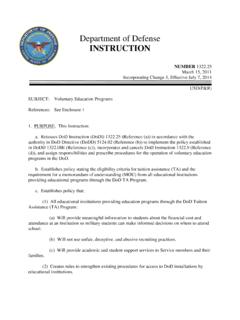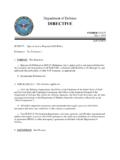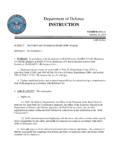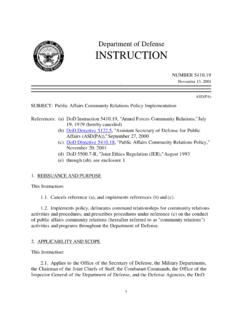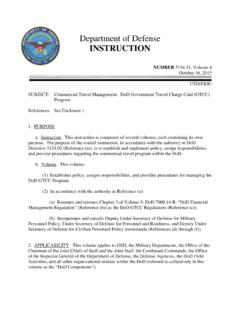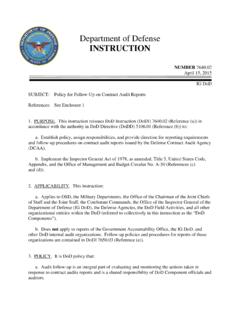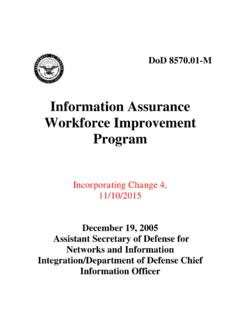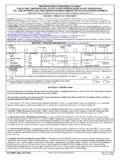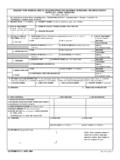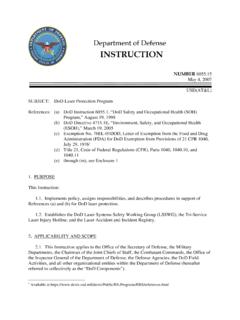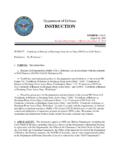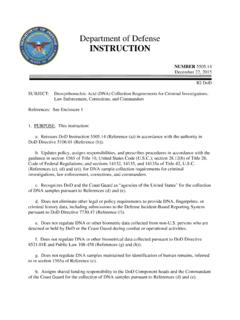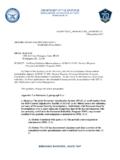Transcription of Department of Defense INSTRUCTION - esd.whs.mil
1 Department of Defense INSTRUCTION . NUMBER March 12, 2014. Incorporating Change 2, July 28, 2017. DoD CIO. SUBJECT: Risk Management Framework (RMF) for DoD Information Technology (IT). References: See Enclosure 1. 1. PURPOSE. This INSTRUCTION : a. Reissues and renames DoD INSTRUCTION (DoDI) (Reference (a)) in accordance with the authority in DoD Directive (DoDD) (Reference (b)). b. Implements References (c) through (f) by establishing the RMF for DoD IT (referred to in this INSTRUCTION as the RMF ), establishing associated cybersecurity policy, and assigning responsibilities for executing and maintaining the RMF.
2 The RMF replaces the DoD. Information Assurance Certification and Accreditation Process (DIACAP) and manages the life- cycle cybersecurity risk to DoD IT in accordance with References (g) through (k). c. Redesignates the DIACAP Technical Advisory Group (TAG) as the RMF TAG. d. Directs visibility of authorization documentation and reuse of artifacts between and among DoD Components deploying and receiving DoD IT. e. Provides procedural guidance for the reciprocal acceptance of authorization decisions and artifacts within DoD, and between DoD and other federal agencies, for the authorization and connection of information systems (ISs).
3 2. APPLICABILITY. a. This INSTRUCTION applies to: (1) OSD, the Military Departments, the Office of the Chairman of the Joint Chiefs of Staff (CJCS) and the Joint Staff, the Combatant Commands, the Office of the Inspector General of the Department of Defense (OIG DoD), the Defense Agencies, the DoD Field Activities, and DoDI , March 12, 2014. all other organizational entities within the Department of Defense (referred to collectively in this INSTRUCTION as the DoD Components ). (2) The United States Coast Guard. The United States Coast Guard will adhere to DoD. cybersecurity requirements, standards, and policies in this INSTRUCTION in accordance with the direction in Paragraphs 4a, b, c, and d of the Memorandum of Agreement Between the Department of Defense and the Department of Homeland Security (Reference (q)).
4 (2)(3) All DoD IT that receive, process, store, display, or transmit DoD information. These technologies are broadly grouped as DoD IS, platform IT (PIT), IT services, and IT. products. This includes IT supporting research, development, test and evaluation (T&E), and DoD-controlled IT operated by a contractor or other entity on behalf of the DoD. b. Nothing in this INSTRUCTION alters or supersedes the existing authorities and policies of the Director of National Intelligence regarding the protection of sensitive compartmented information (SCI), as directed by Executive Order 12333 (Reference (l)) and other laws and regulations.
5 The application of the provisions and procedures of this INSTRUCTION to information technologies processing SCI is encouraged where they may complement or cover areas not otherwise specifically addressed. 3. POLICY. It is DoD policy that: a. The DoD will establish and use an integrated enterprise-wide decision structure for cybersecurity risk management (the RMF) that includes and integrates DoD mission areas (MAs). pursuant to DoDD (Reference (m)) and the governance process prescribed in this INSTRUCTION . b. The cybersecurity requirements for DoD information technologies will be managed through the RMF consistent with the principals established in National Institute of Standards and Technology (NIST) Special Publication (SP) 800-37 (Reference (c)).
6 DoD IS and PIT systems will transition to the RMF in accordance with Table 2 of Enclosure 8 of this INSTRUCTION . c. The RMF must satisfy the requirements of subchapter III of chapter 35 of Title 44, United States Code ( ), also known and referred to in this INSTRUCTION as the Federal Information Security Management Act (FISMA) of 2002 (Reference (d)). DoD must meet or exceed the standards required by the Office of Management and Budget (OMB) and the Secretary of Commerce, pursuant to FISMA and section 11331 of Title 40, (Reference (n)). d. All DoD IS and PIT systems must be categorized in accordance with Committee on National Security Systems INSTRUCTION (CNSSI) 1253 (Reference (e)), implement a corresponding set of security controls from NIST SP 800-53 (Reference (f)), and use assessment procedures from NIST SP 800-53A (Reference (g)) and DoD-specific assignment values, overlays, implementation guidance, and assessment procedures found on the Knowledge Service (KS)
7 At As supporting reference security control documents are updated, DoD's implementation of these updates will be coordinated through the RMF TAG. Change 2, 07/28/2017 2. DoDI , March 12, 2014. e. Resources for implementing the RMF must be identified and allocated as part of the Defense planning, programming, budgeting, and execution process. f. Each DoD IS, DoD partnered system, and PIT system must have an authorizing official (AO) responsible for authorizing the system's operation based on achieving and maintaining an acceptable risk posture. g. Reciprocal acceptance of DoD and other federal agency and Department IS and PIT.
8 System authorizations will be implemented to the maximum extent possible. Refusals must be timely, documented, and reported to the responsible DoD Component senior information security officer (SISO) (formerly known as the senior information assurance (IA) officer). h. All DoD IT identified in paragraph 2a(2) must be under the governance of a DoD. Component cybersecurity program in accordance with DoDI (Reference (h)). i. A plan of action and milestones (POA&M) must be developed and maintained to address known vulnerabilities in the IS or PIT system. j. Continuous monitoring capabilities will be implemented to the greatest extent possible.
9 K. The RMF process will inform acquisition processes for all DoD IT, including requirements development, procurement, and both developmental T&E (DT&E) and operational T&E (OT&E), but does not replace these processes. 4. RESPONSIBILITIES. See Enclosure 2. 5. PROCEDURES. See Enclosure 3. 6. RELEASABILITY. Cleared for public release. This INSTRUCTION is available on the Internet from the DoD Issuances Website at the Directives Division Website at Change 2, 07/28/2017 3. DoDI , March 12, 2014. 7. EFFECTIVE DATE. This INSTRUCTION is effective March 12, 2014. Enclosures 1.
10 References 2. Responsibilities 3. RMF Procedures 4. RMF Governance 5. Cybersecurity Reciprocity 6. Risk Management of IS and PIT Systems 7. KS. 8. RMF Transition Glossary Change 2, 07/28/2017 4. DoDI , March 12, 2014. TABLE OF CONTENTS. ENCLOSURE 1: REFERENCES ..78. ENCLOSURE 2: RESPONSIBILITIES ..910. DoD CHIEF INFORMATION OFFICER (DoD CIO) ..910. DIRECTOR, Defense INFORMATION SYSTEMS AGENCY (DISA) ..910. UNDER SECRETARY OF Defense FOR ACQUISITION, TECHNOLOGY, AND. LOGISTICS (USD(AT&L)) ..910. DASD(DT&E) ..910. DOT&E ..910. DIRECTOR, NATIONAL SECURITY AGENCY/CHIEF, CENTRAL SECURITY.
